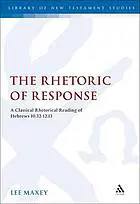

The Rhetoric of Response: A Classical Rhetorical Reading of Hebrews 10:32-12:13
in Library of New Testament Studies
Pages
384
Publisher
T&T Clark
Published
1/1/2007
ISBN-13
9780567027429
Provides an interpretation of Hebrews from the perspective of classical rhetorical compositional theory. This work argues that this unit in Hebrews is deliberative rhetoric advancing a set of four responses to a significant problem facing the community to who Hebrews is addressed, a group of late first century CE Roman Christians.
The Rhetoric of Response is an interpretation of Hebrews 10:32-12:13 from the perspective of classical rhetorical compositional theory. It argues that this unit in Hebrews is deliberative rhetoric advancing a set of four responses to a significant problem facing the community to who Hebrews is addressed, a group of late first century CE Roman Christians. The responses - which ultimately aim to inspire members to continue in the faith of the community and to accept and weather sufferings occasioned by their faith - are accommodated by the following rhetorical structure, which conforms to the standard classical forensic/deliberative speech outline: (1) Exordium (10:32-34); (2) Confimatio (11:1-40); and (3) Concluiso (12:1-13).
The Rhetoric of Response is an interpretation of Hebrews 10:32-12:13 from the perspective of classical rhetorical compositional theory. It argues that this unit in Hebrews is deliberative rhetoric advancing a set of four responses to a significant problem facing the community to who Hebrews is addressed, a group of late first century CE Roman Christians. The responses - which ultimately aim to inspire members to continue in the faith of the community and to accept and weather sufferings occasioned by their faith - are accommodated by the following rhetorical structure, which conforms to the standard classical forensic/deliberative speech outline: (1) Exordium (10:32-34); (2) Confimatio (11:1-40); and (3) Concluiso (12:1-13).
- Table of Contents
- Abbreviations
- Prologue
- Part 1: The Theoretical Framework: Classical Rhetorical Compositional Theory and Practice;
- Chapter 1: Classical Rhetorical Compositional Theory and Practice;
- Part 2: The Classical Rhetorical Reading of Hebrews 10:32-12:13;
- Chapter 2: The First Response and the Start of the Second: the Exordium of Hebrews 10:32-39;
- Chapter 3: The Second Response Continued: The Confirmatio of Hebrews 11:1-40;
- Chapter 4: The Final Responses: The Conclusio of Hebrews 12:1-13;
- Epilogue
- Appendices
- Select Bibliography